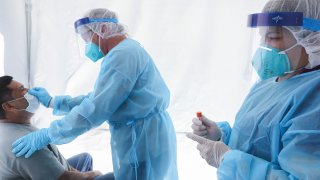
The number of coronavirus patients at Los Angeles County hospitals has increased by 34 to 1,205, according to the latest state numbers.
Of those patients hospitalized as of Saturday, 123 were being treated in intensive care, down from 131 the previous day.
Health officials have said previously that roughly 40% of the patients were actually admitted for COVID-related issues, while the rest were admitted for other reasons but tested positive at the hospital.
The latest figures came one day after local health officials reported another 4,744 COVID-19 infections, continuing a surge in daily cases that could soon lead to a renewed requirement for people to wear masks at all indoor public spaces.
Get top local stories in Southern California delivered to you every morning. >Sign up for NBC LA's News Headlines newsletter.
Those new cases reported Friday gave the county a cumulative total from throughout the pandemic of 3,552,019, according to the Los Angeles County Department of Public Health. Another 14 deaths were also reported Friday, raising the cumulative death toll to 34,213.
The seven-day average daily rate of people testing positive for the virus was 12.2% as of Friday.
The county has been logging steady increases in daily infections and hospitalizations since the beginning of November. As of Friday, the county's average daily number of new infections over the past seven days was 3,053, up from 2,121 a week ago.
Local
Get Los Angeles's latest local news on crime, entertainment, weather, schools, COVID, cost of living and more. Here's your go-to source for today's LA news.
The average daily number of COVID-positive patients in county hospitals was 1,056 as of Friday, up 39% from a week ago.
The current surge is being blamed largely on a pair of new variants of the virus, known as BQ.1 and BQ.1.1. Both are offshoots of the BA.5 variant that was blamed for rises in infection numbers earlier this year.
“While there still is uncertainty about what the impact of COVID-19 will be this winter, there is mounting evidence that we are entering another COVID-19 surge,'' county Public Health Director Barbara Ferrer said in a statement.
“In some ways this surge is likely to be different -- we know more about COVID, have tools to help mitigate severe outcomes, and we are more aware of symptoms and when to take action. On the flip side, this will be the first winter where we are facing rising levels of COVID, with emerging new strains we know less about, along with unusually high flu and RSV (respiratory syncytial virus) activity.”
Ferrer said Thursday that the rising case and hospitalization numbers have moved Los Angeles County from the ``low'' COVID community activity level to the “medium” category, as defined by the U.S. Centers for Disease Control and Prevention. She said the county is on pace to reach the “high” level in a matter of days, when the rate of new cases reaches 200 per 100,000 residents.
The rate is currently 185 per 100,000 residents.
The move to “medium” did not prompt any immediate changes to public health mandates, such as indoor masking -- which remains “strongly recommended” by the county.
But masking could again become mandatory indoors in a matter of weeks, Ferrer said.
The masking mandate would return if the county enters the “high” community level, which is expected by next week, and if the county's virus-related hospitalization numbers reach two thresholds -- if the rate of daily hospital admissions tops 10 per 100,000 residents and the percent of staffed hospital beds occupied by COVID patients tops 10%.
The county has already surpassed the first threshold, with the rate of daily hospital admissions already at 11.9 per 100,000 residents as of Thursday. But the level of hospital beds occupied by COVID patients was still 5.9% as of Thursday, below the 10% threshold.
Masks are still required indoors at health-care and congregate-care facilities, for anyone exposed to the virus in the past 10 days, and at businesses where they are required by the owner.
Ferrer again noted that the actual number of COVID infections in the community is likely much higher than the official numbers reflect -- thanks to the prevalent use of at-home tests that aren't reported to the county, and due to the number of people who are likely sick but don't get tested at all.



